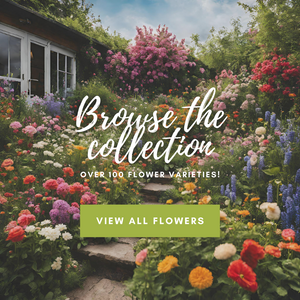
What a Long, Strange Trip It's Been.....
Spring that is. Whether you accept global warming, or not, we are in the midst of a weird spring! Temperature highs in the 50's and 60's one day, then 80's and higher the next. A farmer friend shared that he lost 40% of his pepper crop due to these fluctuations. Our poor gardens just don't know what to do.
Hopefully we are over the hump, of chilly night time temps that is. However, we are terribly dry. Flash flood warnings have been posted on the local news for later today, but as most gardeners know - we need a long soaking rain to make a difference.
Here are some tips to help with water conservation and more!
Irrigation is becoming a necessity. Soaker hoses on timers are an excellent alternative. Soakers allow for slow watering and if you allow them to run for 2-4 hours at a time, the water will penetrate deeper into the soil. I am a fan of timers since I usually forget to turn the water off after an hour. Fancy systems are no longer necessary. Simple battery operated timers are available, which allow us to feel like we finally have a clone helping us - at least for watering!
Sprinklers can cover larger areas but are best run in the morning or evening to reduce evaporation. While the atmosphere needs water, I would rather allow it to soak into my garden first.
Mulch is a great water conserver. No matter what type of material you choose - straw, moldy hay, wood chips, shredded leaves and even grass clippings can help the soil retain moisture and control weed growth. An added bonus is all the organic matter that will go back into your soil. It is easy to take life/nutrients out of the soil and many times we forget to put them back in!
For those random chilly nights - which are still possible I suppose - floating row covers can provide added protection to tender plants. These wonders can also aid in pest control. If the bugs can't get to your plants, it is harder to eat them.
Lastly, a word of warning. Be cautious with chemical usage when it is terribly hot. Some chemicals do not react well with intense, hot sun and can cause adverse reactions on your plants. If possible, apply chemicals in the early morning or evening, when temps cool a bit. Keep in mind that many times there are other alternatives to harsh chemicals, as well. Feel free to ask about other options in our store or at your local Extension Office.
Hopefully we are over the hump, of chilly night time temps that is. However, we are terribly dry. Flash flood warnings have been posted on the local news for later today, but as most gardeners know - we need a long soaking rain to make a difference.
Here are some tips to help with water conservation and more!
Irrigation is becoming a necessity. Soaker hoses on timers are an excellent alternative. Soakers allow for slow watering and if you allow them to run for 2-4 hours at a time, the water will penetrate deeper into the soil. I am a fan of timers since I usually forget to turn the water off after an hour. Fancy systems are no longer necessary. Simple battery operated timers are available, which allow us to feel like we finally have a clone helping us - at least for watering!
Sprinklers can cover larger areas but are best run in the morning or evening to reduce evaporation. While the atmosphere needs water, I would rather allow it to soak into my garden first.
Mulch is a great water conserver. No matter what type of material you choose - straw, moldy hay, wood chips, shredded leaves and even grass clippings can help the soil retain moisture and control weed growth. An added bonus is all the organic matter that will go back into your soil. It is easy to take life/nutrients out of the soil and many times we forget to put them back in!
For those random chilly nights - which are still possible I suppose - floating row covers can provide added protection to tender plants. These wonders can also aid in pest control. If the bugs can't get to your plants, it is harder to eat them.
Lastly, a word of warning. Be cautious with chemical usage when it is terribly hot. Some chemicals do not react well with intense, hot sun and can cause adverse reactions on your plants. If possible, apply chemicals in the early morning or evening, when temps cool a bit. Keep in mind that many times there are other alternatives to harsh chemicals, as well. Feel free to ask about other options in our store or at your local Extension Office.




Leave a comment